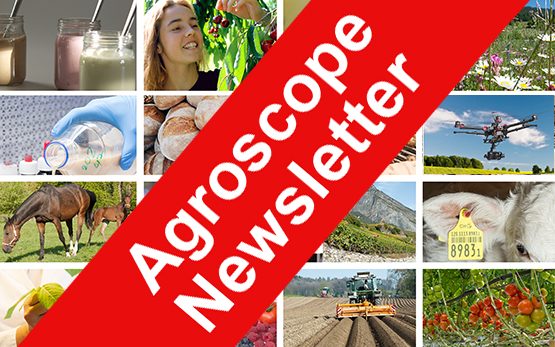Grassland Researchers Meet in Zurich
Bern, 25.06.2019 - Switzerland is a grassland. The climate and soil provide ideal conditions for grass production, and thus for sustainable milk and meat production, whilst natural conditions are often unfavourable for arable farming. However, grass production too is facing new challenges. Despite extreme weather such as drought, the agricultural sector aims to produce top-quality forage, so that concentrate use can be reduced as much as possible. To this end, 270 researchers from 33 countries will be presenting their approaches to dealing with the challenges involved at the EGF-EUCARPIA 2019 Symposium for Forage Production and Forage-Plant Breeding. The symposium, which takes place from 24–27 June at ETH Zurich, is organised by Agroscope, among others – thus confirming Switzerland’s trailblazing role in this research field.
Switzerland has a tradition of cultivating plant communities of grasses, legumes and forbs – so-called clover-grass mixtures. Numerous recent research papers bear out the major advantages of these mixed crops over monocultures, as well as the great wealth of Swiss experience in this area.
Mixtures safeguard yield, stability and soil health
The largest share of Swiss grassland is on land that is unsuitable for arable farming – so-called permanent meadows. But clover-grass mixtures are also particularly valuable elements on arable land. In Switzerland, arable land is managed in rotation, with different crops such as wheat, maize, potatoes, and clover-grass mixtures being alternated. The rhizobia colonising the clover roots fix nitrogen from the air, thereby making it available for the plants. This natural nitrogen fertiliser not only increases the yield of grass and clover for top-quality feed, but is also effective for the following crop. At the same time, clover-grass mixtures reduce weed pressure and improve soil water-storage capacity. Diseases and pests cannot be transmitted to the subsequent field crop. For all these reasons, clover-grass mixtures are ecologically valuable.
The production of milk and cheese on the basis of grass is of key importance in Switzerland. That’s why forage-plant breeding, mixtures development and cultivation advice are established fields, and practical knowledge is outstanding. “Mixtures cultivation and the excellent cooperation between research, the seed trade, extension, and farmers, are unique in Switzerland, and exemplary in nature” confirms Andreas Lüscher, an Agroscope researcher and symposium organiser.
Fighting Drought with Plant Breeding and Forage Production
In the summer of 2018, the consequences of prolonged drought were making themselves felt. The absence of rain meant that forage yields were considerably lower, which led to a reduction in cattle numbers. However, multi-year trials also showed that yields increase again after dry periods, since stressed plants build stronger roots. Forage-plant varieties bred for drought tolerance are able to better withstand drought. In close collaboration with ETH Zurich, Agroscope is investigating ways of further improving the drought tolerance of forage plants, and thus making drought-resistant varieties available to farmers.
Switzerland is playing a leading role in this field, and is also giving high priority to knowledge exchange, such as that taking place within the context of the EGF-EUCARPIA Symposium.
***
The EGF-EUCARPIA Symposium
The largest European symposium on grassland sciences and forage-plant breeding on the topic ‘improving sown meadows through breeding and management’ takes place from 24–26 June 2019. Notably, this year’s symposium is for the first time being hosted jointly by the European Grassland Federation (EGF) and the European Association for Research on Plant Breeding EUCARPIA. Representatives from the research sector, universities, extension and the private sector will be meeting up to exchange knowledge. The symposium was organised by Agroscope and ETH Zurich, as well as the Federal Office for Agriculture FOAG, the School of Agricultural, Forestry and Food Sciences (HAFL), and the Swiss Grassland Society (AGFF). You’ll find more on further topics such as the environmental and production-technology advantages of mixtures cultivation, genomic predictions on the drought tolerance of grasses, and the analysis of plant/soil-microbe interactions, at EGF-EUCARPIA Joint Symposium 2019 (www.egfeucarpia2019.ch).
***
Address for enquiries
Agroscope Media Service
+ 41 58 466 88 62
media@agroscope.admin.ch
www.agroscope.ch | Good food, healthy environment
Publisher
AGROSCOPE
http://www.agroscope.admin.ch






